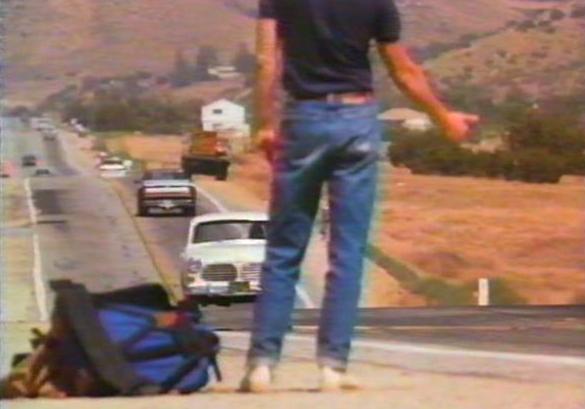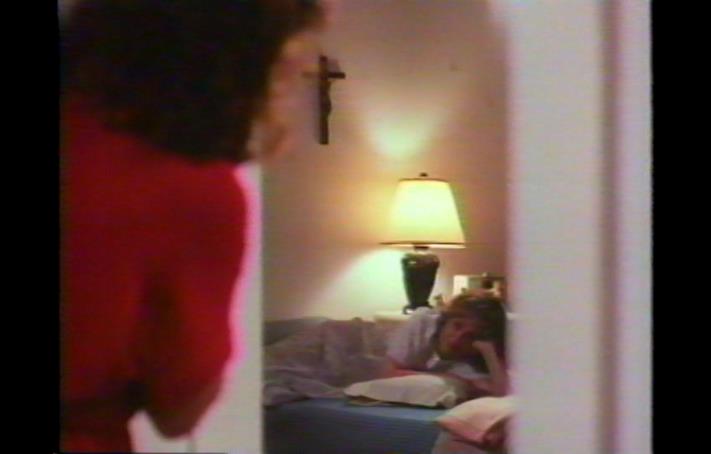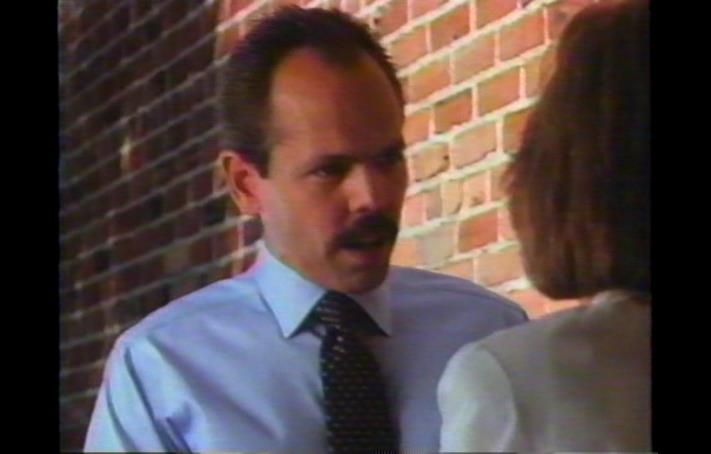Cast the First Stone (1989)
For a guy who had to build additional shelves to house his horror and kung-fu/ninja DVD collection, I realize reviewing a sappy made-for-television special from 1989 isn’t something I would normally review. And to be honest, it’s not something I would normally even watch, must less review. However, while combing through thrift store VHS tapes in search of commercials to rip and upload to my YouTube playlist, I ran across this movie and (somehow) got sucked into watching it.

(The first movie on the tape (labelled “?? – John Goodman”) turned out to be The Big Easy, starring Dennis Quaid, Ellen Barkin, and Ned Betty. Good luck finding three people who would describe this as a “John Goodman” film.)
Type Cast the First Stone into IMDB and the site’s search engine suggests 2000’s Cast Away and 1966’s Cast a Giant Shadow (starring Kirk Douglas and John Wayne) before offering up the “Cast of Baby Daddy.” Performing the actual search reveals four television episodes and another movie with the same name. Google also turned up a band and a Slayer song with the same name. In retrospect I wish I had watched or listened to any of those things rather than watching this movie.
Our story begins with Diane Martin (Jill Eikenberry, L.A. Law), an innocent (and perhaps naive) school teacher, returning from a Catholic retreat. During her drive home Diane sees and picks up a random hitchhiker, Andy (Sandy Bull). The two of them have a conversation about how Diane picks up hitchhikers because she and her friend hitchhiked across Europe back when they were in college.

Things are set in motion that evening when Diane stops at a motel, lets Andy out, and gets a room for herself. Later, during a rainstorm, Andy locates her room and asks Diane if she will let him sleep on his floor. Reluctantly, she lets him in. In the middle of the night, unable to sleep, Andy retrieves a knife from his backpack and rapes Diane.
STRANGER DANGER!
Diane, feeling embarrassed, ashamed, and humiliated, does not report the rape to the police. Instead, she returns home the following day and, over time, attempts to resume her life. Things become complicated, however, when Diane’s doctor informs her that she is pregnant.
At first, Diane is reluctant to tell anyone she has been raped, and when she does begin to tell people, nobody believes her. Her sister doesn’t believe her, the principal of her school doesn’t believe her, the parents of her students don’t believe her, and the school board doesn’t believe her. All of these people think Diane has made up the rape story to cover up the fact that she is having a child out of wedlock. And when people find out that she plans on keeping the baby, that’s when the townsfolk really begin to revolt.
Let me state that again. When the parents of her students and the school board learn that Diane the Catholic plans on keeping the baby instead of aborting it, that’s when they turn on her.

In one scene, we see Diane concerned about a student who obviously has dyslexia. A meeting with the student’s mother goes south when the parent demands her daughter not be labelled as a student with a learning disability. Later in the year, the same parent complains about Diane when her daughter’s grades haven’t improved. Eventually every parent who has any complaint at all about the school bands together in a motion to have the tenured Diane dismissed.
While Diane is in labor with her son, the school board finds her “guilty of immorality.” (This was back before Facebook.) Diane does return to the school, but after multiple parents and fellow teachers continue to complain about her lack of morality, she is fired. (Diane is by far the most moral person in this TV film.)
Because Cast the First Stone takes place in the late 1980s, we have the typical problems that would be easily resolved by today’s technology. In one scene, Diane attempts to set up an appointment with a counselor but is forced to hang up when students approach the pay phone she is using to make the call. In another scene, we are told that the local police are helpless to track down whoever has been prank calling Diane and calling her a whore because they can’t keep the caller on the line long enough to stay on the line. I’m as nostalgic about the 1980s as the next guy, but life before cell phones and Caller ID had its limitations.
After being fired, Diane teams up with an attorney (Refson) who takes her case in an attempt to help Diane get her job back. From a moral and I suppose legal aspect I understand this, but why would Diane want to work at a school (or in a town) where literally every single person hates her? The only thing missing from this film is a scene where a convicted child molester walks by Diane and spits on her.
After going on trial for “violating moral codes,” where she is (again) accused of making up her story, Diane is eventually successful in getting her job back. Sorry if I just spoiled an 80s TV movie that you will never watch.

Although Cast the First Stone was released in 1989, the actions, thoughts and values of the characters in the film seemed like they were from an earlier time, and after a bit of digging I think I’ve discovered why. The character of Diane Martin and the events in this film were “inspired by a true story” that originally took place in the late 70s.
(For the record, other films listed as being “inspired by a true story” include the Texas Chainsaw Massacre, The Amityville Horror, The Mothman Prophecies, and The Fourth Kind, a film that claimed hundreds of people missing from Nome, Alaska had been abducted by aliens, so there’s that.)
Diane Martin’s story was inspired by the story of Jeanne Eckmann. Like the fictional Diane, Eckmann too was a school teacher who claimed to have been raped and was later fired from her job. Unlike Diane, Eckmann won a $3.3 million dollar settlement from the (then) past and present school board members. (I was surprised when that article named Eckmann’s four year old son by name — another case of “how things used to be done,” I suppose.) I know nothing about the real life case that inspired the fictional television movie, and can only say that real life is complicated and there are three sides to every story. Jeanne Eckmann died in 2001 and took her side of the story with her.
As for Cast the First Stone, I’m not sure if any of that was covered in an epiloge or not. After the verdict of Diane’s trial is announced, my copy abruptly jumps to an episode of Star Trek: The New Generation. I found used VHS copies of the film available on Amazon for as low as $4, but it’s not worth that to me to find out.
January 15th, 2016 at 7:21 am
Just when Rob was about to tell us about all the cool commercials he found on this videotape from the thrift store, he throws us a curve, tells us the denouement of the really bad film was taped over by an episode of Star Trek: The NEW Generation.
Well played, Star Wars guy, well played. You got us.